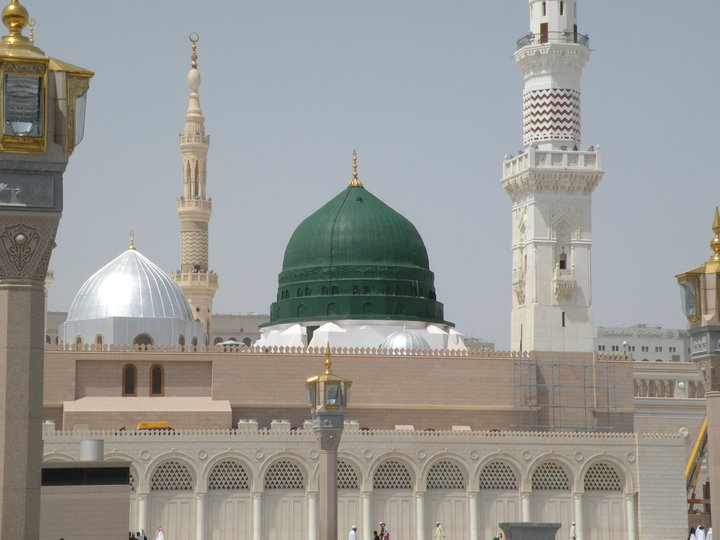
There are several traditions of Muhammad’s final words contained in Islamic religious documents.[1] Sahih al-Bukhari relates:
When the disease of Allah’s Messenger (ﷺ) got aggravated, he covered his face with a Khamisa, but when he became short of breath, he would remove it from his face and say, “It is like that! May Allah curse the Jews Christians because they took the graves of their prophets as places of worship.” By that he warned his follower of imitating them, by doing that which they did.[2]
Ironically, this is exactly what happened to Muhammad’s grave. The Green Dome in Medina was built on the prophet’s tomb and is visited by millions of pilgrims every year.
In another reference to Muhammad’s death, it is said:
Thursday! And how great that Thursday was! The ailment of Allah’s Messenger (ﷺ) became worse (on Thursday) and he said, fetch me something so that I may write to you something after which you will never go astray.” The people (present there) differed in this matter, and it was not right to differ before a prophet. Some said, “What is wrong with him ? (Do you think ) he is delirious (seriously ill)? Ask him ( to understand his state ).” So they went to the Prophet (ﷺ) and asked him again. The Prophet (ﷺ) said, “Leave me, for my present state is better than what you call me for.” Then he ordered them to do three things. He said, “Turn the pagans out of the ‘Arabian Peninsula; respect and give gifts to the foreign delegations as you have seen me dealing with them.” (Sa`id bin Jubair, the sub-narrator said that Ibn `Abbas kept quiet as rewards the third order, or he said, “I forgot it.”) (See Hadith No. 116 Vol. 1)[3]
And in another Hadith it was written:
When Allah’s Messenger (ﷺ) was healthy, he used to say, “No prophet dies till he is shown his place in Paradise, and then he is given the option (to live or die).” So when death approached him(during his illness), and while his head was on my thigh, he became unconscious for a while, and when he recovered, he fixed his eyes on the ceiling and said, “O Allah! (Let me join) the Highest Companions (see Qur’an 4:69),” I said, “So, he does not choose us.” Then I realized that it was the application of the statement he used to relate to us when he was healthy. So that was his last utterance (before he died), i.e. “O Allah! (Let me join) the Highest Companions.”[4]
Was asking for forgiveness an acknowledgment of his crimes, disseminating havoc throughout Arabia? We may never know what he truly believed, whether he was cognizant that his teachings were lies, or whether he actually perceived himself as God’s prophet. It seems, however, that he was fearful of death, and what fate would behold his soul when his body expired.[5] He was not sinless, as he was given this revelation: “So be patient, [O Muhammad]. Indeed, the promise of Allah is truth. And ask forgiveness for your sin and exalt [ Allah ] with praise of your Lord in the evening and the morning.”[6] One Hadith notes: “I heard the Messenger of Allah (ﷺ) saying, ‘I swear by Allah that I seek Allah’s Pardon and turn to Him in repentance more than seventy times a day.’”[7] Asking for repentance seventy times a day sounds to be of a person overly insecure about their status in God’s eyes.
[1] https://answeringislam.org/Authors/Arlandson/death_mu_jesus.htm
[2] https://sunnah.com/bukhari/77/33
[3] https://sunnah.com/bukhari/64/453
[4] https://sunnah.com/bukhari/80/45.
[5] https://answeringislam.org/Authors/Arlandson/sinless.htm
[6] Quran, 40:44, https://quran.com/40.

Leave a Reply
You must be logged in to post a comment.